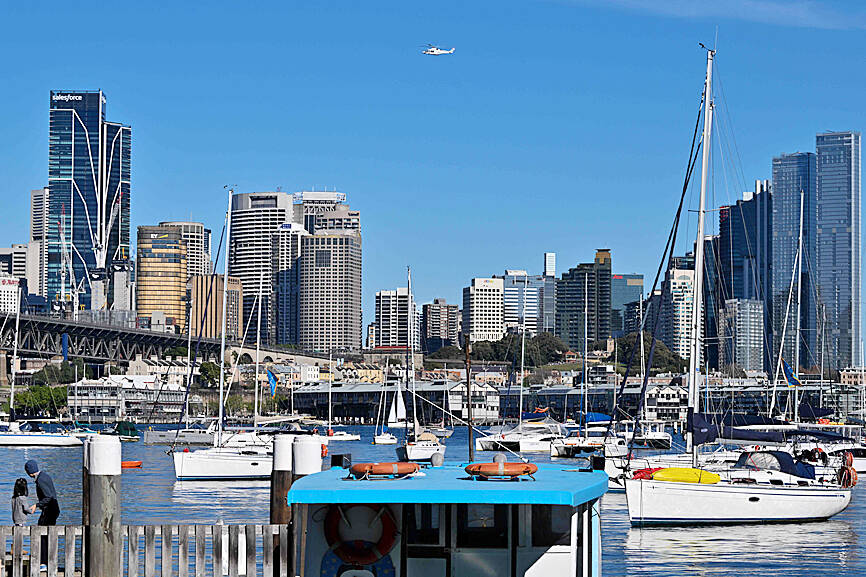Australia warned on Monday that the “softness” of China’s economy and tumbling iron ore prices could leave a multibillion-dollar hole in the nation’s budget.
Troubles in China’s massive construction sector have seen iron ore prices drop about 30 percent since the start of the year — and the ripple effects are now being felt in Australia.
Australia is the world’s largest producer of iron ore, the main raw component for making steel used in building homes, railways and other infrastructure.

Photo:AFP
Australian Treasurer Jim Chalmers warned the “softness in the Chinese economy” and sinking iron ore prices were reminders that Australia was “not immune from volatility and uncertainty in the global economy.”
His department now believes the faster-than-expected fall could reduce tax receipts by about A$3 billion (US$2 billion) over the next three to four years.
The metal accounted for 18 percent of Australia’s total exports last year. After months of worry about China’s ailing real-estate sector and excess manufacturing capacity, the price of iron ore sank by more than 7 percent in the past week alone.
China Baowu Steel Group Corp (寶武鋼鐵集團), the world’s largest steelmaker, last week warned that the sector’s troubles could be longer and more severe than expected.
Australian mining firms have already taken a hit, with shares in Rio Tinto Ltd and BHP Group Ltd — two of the world’s biggest producers — down about 20 percent since the start of the year.
Reserve Bank of Australia Governor Michele Bullock told the Australian parliament last week that given the country’s dependence on China, she was watching the situation closely.
“Developments in China can have quite a big impact on the way our trade develops, and therefore on our growth,” she said.
“It’s our biggest trading partner, and it’s very important in particular for the prices of the commodities that we export, in particular iron ore,” she added.
The Reserve Bank of Australia remains some way off easing monetary policy, as inflation is proving persistent and would only return back to the target range late next year, Bullock said last week.
The Reserve Bank has kept its policy rate at a 12-year high of 4.35 percent since November last year.

In Italy’s storied gold-making hubs, jewelers are reworking their designs to trim gold content as they race to blunt the effect of record prices and appeal to shoppers watching their budgets. Gold prices hit a record high on Thursday, surging near US$5,600 an ounce, more than double a year ago as geopolitical concerns and jitters over trade pushed investors toward the safe-haven asset. The rally is putting undue pressure on small artisans as they face mounting demands from customers, including international brands, to produce cheaper items, from signature pieces to wedding rings, according to interviews with four independent jewelers in Italy’s main

Japanese Prime Minister Sanae Takaichi has talked up the benefits of a weaker yen in a campaign speech, adopting a tone at odds with her finance ministry, which has refused to rule out any options to counter excessive foreign exchange volatility. Takaichi later softened her stance, saying she did not have a preference for the yen’s direction. “People say the weak yen is bad right now, but for export industries, it’s a major opportunity,” Takaichi said on Saturday at a rally for Liberal Democratic Party candidate Daishiro Yamagiwa in Kanagawa Prefecture ahead of a snap election on Sunday. “Whether it’s selling food or

CONCERNS: Tech companies investing in AI businesses that purchase their products have raised questions among investors that they are artificially propping up demand Nvidia Corp chief executive officer Jensen Huang (黃仁勳) on Saturday said that the company would be participating in OpenAI’s latest funding round, describing it as potentially “the largest investment we’ve ever made.” “We will invest a great deal of money,” Huang told reporters while visiting Taipei. “I believe in OpenAI. The work that they do is incredible. They’re one of the most consequential companies of our time.” Huang did not say exactly how much Nvidia might contribute, but described the investment as “huge.” “Let Sam announce how much he’s going to raise — it’s for him to decide,” Huang said, referring to OpenAI

The global server market is expected to grow 12.8 percent annually this year, with artificial intelligence (AI) servers projected to account for 16.5 percent, driven by continued investment in AI infrastructure by major cloud service providers (CSPs), market researcher TrendForce Corp (集邦科技) said yesterday. Global AI server shipments this year are expected to increase 28 percent year-on-year to more than 2.7 million units, driven by sustained demand from CSPs and government sovereign cloud projects, TrendForce analyst Frank Kung (龔明德) told the Taipei Times. Demand for GPU-based AI servers, including Nvidia Corp’s GB and Vera Rubin rack systems, is expected to remain high,